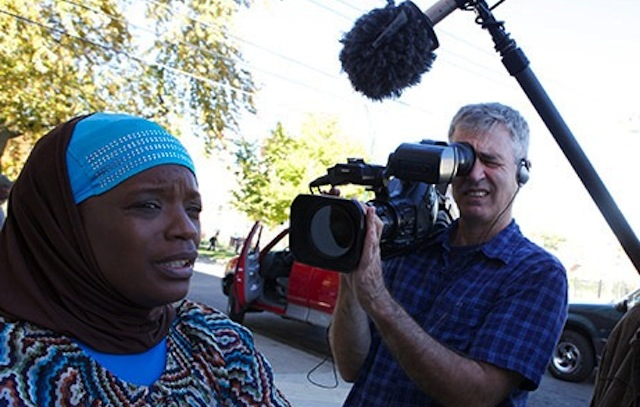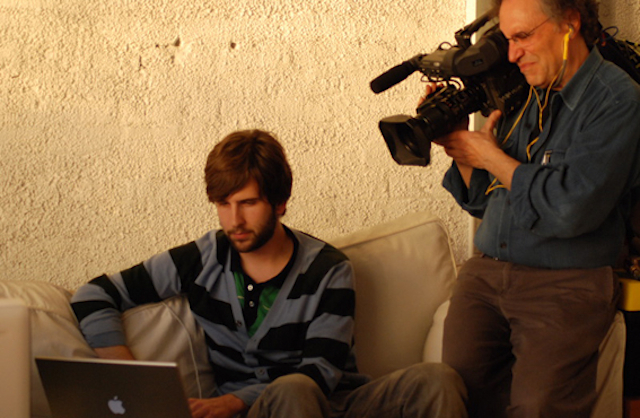CHICAGO – In anticipation of the scariest week of the year, HollywoodChicago.com launches its 2024 Movie Gifts series, which will suggest DVDs and collections for holiday giving.
Interview: Gordon Quinn of Kartemquin Films on Life After 50
CHICAGO – In the final chapter of a three-part interview, Gordon Quinn of Kartemquin Films desires to evolve forward, soon after the celebrations of the 50th anniversary of the iconic Chicago documentary house have past. The “studio” Quinn co-founded has kept their integrity intact, and strives to keep cinematically exploring human drama that promotes understanding between all levels of contemporary society.
There have been several high profile documentaries that have expressed that understanding, and have forged a pathway that “Hoop Dreams” opened up for them. “Vietnam, Long Time Coming” (1998), “The New Americans” (2004) series on PBS, “No Crossover: The Trial of Allen Iverson” for ESPN, “The Interrupters” (2011), “The Trials of Muhammad Ali” (2013) and “Life Itself” (2014) stand proudly alongside the best of the last 50 years, with three more films in post production awaiting release.

Director Steve James Composes ‘The Interrupters’ (2011)
Photo credit: Kartemquin Films
In PART THREE, Kartemquin filmmaker Gordon Quinn reflects on the post “Hoops” year, and what the studio anticipates in the future, so that this evolution revolution continues to percolate. Kartemquin Films will have a 50th Anniversary Gala on Friday, June 24th, 2016. For details, click here.
HollywoodChicago.com: You directed a significant post-’Hoop Dreams’ documentary called ‘Vietnam, Long Time Coming.’ What did you learn from your generational brothers that you honestly didn’t know before, or never realized?
Gordon Quinn: I was part of the anti-Vietnam War movement, and one of the things that was a strong value post the war was veterans, and veterans issues. We may have been against the war, but we absolutely believed that veterans needed to be taken care of, and their benefits needed to be expanded – so I was already there.
When we did ‘Vietnam, Long Time Coming,’ I sought to bond with the veterans that were part of the journey. And the way that you do that is to be honest about yourself. All of us on the crew, including Jerry Blumenthal and Peter Gilbert, were all honest with those veterans about who we were and what are politics are. We then were able to forge a real relationship with them – we don’t make films where we mislead people.
HollywoodChicago.com: What was most poignant to you as you rode with the veterans, [the film was about a bicycle trip] as far as experiencing in-country Vietnam through them?
Quinn: It was a great experience making that film, to experience the consequences of war through them, and the courage that it took to have these veterans go back, in some cases to the very spot where they were shot or disabled. That was powerful.
HollywoodChicago.com: ‘The Interrupters’ was a remarkable film, and remains contemporary, given the everyday gun violence still on the streets of Chicago. There were rumors of multiple versions of the final cut, so what was behind the constant tweaking of the film?
Quinn: We tease director Steve James about this, but not many people realize the even ‘Hoop Dreams’ had several versions. The version that famously premiered at Sundance was not the version that came out theatrically – although it was only eight minutes shorter. When we made the distribution deal, we were offered 50 thousand dollars to take out a half hour from the film, so it would be nearer to two hours. When we only cut eight minutes, I went back to them and said, ‘can we prorate it?’ [laughs] Needless to say, their reply was ‘bullshit.’
Steve’s films often go through many edits. The first deadline are the film festivals. Then we see it with those audiences, and we realize other things that can be cut. ‘The Interrupters’ did go through a few versions, and then it had to be shortened again to play on the PBS series ‘Frontline.’ Most of that is a combination of our realizations that the film needs to be tightened to be better, or fitting it into a different format. It has nothing to do with trying to change the meaning or censorship or anything like that.

Executive Producer Gordon Quinn Sets Up a Shot in the Documentary ‘Typeface’ (2009)
Photo credit: Kartemquin Films
HollywoodChicago.com: Kartemquin has always prided itself in the interaction with the community. What is going on in 2016 that continues that philosophy of outreach?
Quinn: In the days when the company was a collective, it occurred to me that we focused on skill sharing. A number of our members were union organizers and teachers, with the other part being the filmmaking practitioners. We were trying to teach ordinary folks the craft of filmmaking, and some actually went on to work in the film business.
When you look at the programs of today, our internships and our labs – where someone can come with a work-in-progress film and get it critiqued by the Kartemquin brain trust – was something we always did, but now it is formalized. We also have our ‘Diverse Voices in Docs’ program, which helps minority filmmakers get into the bigger platforms in the media system, like broadcast. It’s about the reel and the pitch, and what they need to do.
HollywoodChicago.com: The market for documentaries is almost reverting to the same status as when you began – that of a more underground art form that is being lost in the much broader spectrum of digital choices. How does the documentary, the art form that Kartemquin helped to evolve, stay relevant in the multi-choice digital age?
Quinn: It’s complicated. I’m someone who still believes in broadcasting, that there is something to be gained with having something available at a particular time, where lots of people can access it at the same time. We care about broadcasting, and still go after it. But there is Netflix, Amazon and the like, and actually these new platforms have money and are going after documentaries. In many ways, there are so many more places to show your doc than when we were starting out, but what disturbs me is when the market gets broader, to produce films for lower budgets become greater and greater.
HollywoodChicago.com: How are film producers like Kartemquin adjusting to these budget parameters?
Quinn: Everybody is looking for product – to fill their slots and menus – and at Kartemquin we’re still trying to make films that will play a role in the democratic process. We can’t cut corners, we have to tell our stories, that connect people across the diverse elements of America. For example, lately we’ve been getting push backs on our budgets, because our editing costs are higher than most others.
And I tell them, ‘yeah, that’s why our films are so good.’
Click here for PART ONE of the interview.
Click here for PART TWO of the interview.
 | By PATRICK McDONALD |


